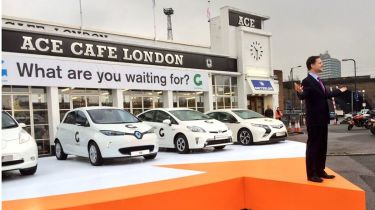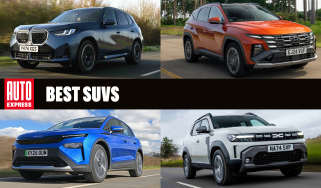Nick Clegg launches 'Go Ultra Low' with £9.3m investment
New Government campaign invests millions into chargepoints for ultra-low emission vehicles

Deputy Prime Minister Nick Clegg has announced a £9.3 million investment in car charging infrastructure to support the launch of a new ultra-low emission vehicle (ULEV) campaign.
BMW, Nissan, Renault, Toyota and Vauxhall have all supported the ‘Go Ultra Low’ campaign that aims to encourage motorists to switch to pure electric, plug-in hybrid or extended range cars.
In the last three years almost 20 electric and plug-in cars and vans have been launched into the UK market such as the BMW i3, Nissan LEAF and Vauxhall Ampera - and the Government wants to make it more convenient to own one.
• Police shocked by motorists filming crash on phones
Deputy Prime Minister Nick Clegg said: “Electric cars are one of the most promising of our green industries and we want to secure the UK’s position as a global leader in both the production and adoption of these vehicles.
“The extremely low running costs of these cars help drivers save money and we are allocating more than £9 million to boost chargepoints across the country to help drivers to go green.”
£5.8m investment in 140 rapid charge points
To launch the campaign, the Government has signed off on £5.8m for more than 140 new rapid chargepoints that can fully recharge a ULEV in 30 minutes.
These will be installed in towns and roads were there is currently a lack of chargepoints in order to create a UK-wide network of 500 rapid points.
A further £600,000 will be spent on 80 points in train station car parks while grants worth £2.9m have be awarded to public sector organisations to install 450 chargepoints on their own land for staff, business fleets and visitors.
Successful bids include the Ministry of Defence, NHS trusts, Devon and Somerset Fire Service and London Fire Service, Gloucestershire Police and several local authorities.
The Government has also previously committed £5m to invest in the introduction of electric vehicles into its own fleets this year.
• Smoking in cars carrying kids could be banned
The collaborative ‘Go Ultra Low’ initiative is the first of its kind bringing together leading manufacturers with the Department of Transport, the Office for Low Emission Vehicles and The Society of Motor Manufacturers and Traders (SMMT).
The scheme will be promoted with national print advertising, radio slots, celebrity ambassadors and fleet partnerships throughout 2014.
Mike Hawes, chief executive of SMMT added: “Some of the country’s leading automotive brands are pooling resources with Government to encourage more car buyers to consider going ultra-low.”
Professor Stephen, director of the RAC Foundation, still believes that ultra low carbon cars have a long way to go. He said:
“The UK is at the forefront of the green car technology but so far that has not been matched by our willingness to buy the products. Sales of ultra low carbon cars have been sluggish and the government still has a couple of hundred million pounds of grants available to purchasers that it literally can’t give away. The good news is that the upfront cost of electric vehicles is falling. However the perception gap is still wide with many people still unclear of the benefits green cars can deliver them. That’s why we’ve got this campaign.”
• Police shocked by motorists filming crash on phones• Smoking in cars carrying kids could be banned
Find a car with the experts


